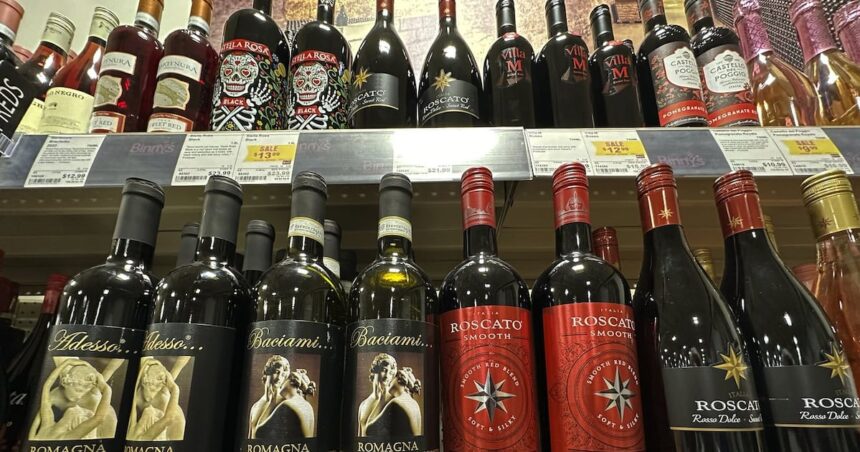Last week, Saskatchewan became the second Canadian province to reopen its liquor market to American products, following a provincial policy reversal that marks another step in cooling tensions after last year’s escalating cross-border trade dispute.
The Saskatchewan Liquor and Gaming Authority (SLGA) confirmed it would resume purchasing American alcohol products effective immediately, ending a retaliatory measure that had been in place since last August when both Saskatchewan and Alberta halted US liquor imports in response to Canada’s digital services tax.
“This decision brings our approach back in line with the national position and helps provide certainty for our hospitality sector,” said Dustin Duncan, Saskatchewan’s Minister Responsible for SLGA. “We’ve heard from restaurants and retailers who want consistent access to popular American brands their customers expect.”
The province’s decision follows Alberta’s similar move in April, when it became the first to resume American alcohol purchases after the federal government and US administration reached a negotiated pause on the trade dispute earlier this year. That agreement suspended Canada’s implementation of the 3% digital services tax until 2025, with the US halting corresponding tariff threats.
For Saskatchewan bars and restaurants, the impact of the ban had been increasingly challenging. James McInnis, who owns three establishments in Regina, described the situation as “death by a thousand cuts” for businesses already struggling with inflation and labor costs.
“We lost some of our top-selling spirits and craft beers overnight,” McInnis explained. “You can only tell customers ‘we don’t have that anymore’ so many times before they stop coming back.”
The provincial boycott had directly affected approximately $20 million worth of annual American alcohol imports to Saskatchewan, according to government estimates. While relatively small in the context of Canada-US trade, the boycott carried symbolic weight in a relationship where total bilateral trade exceeds $800 billion annually.
Industry analysts suggest the timing isn’t coincidental. “This decision comes right before peak summer tourism and patio season,” noted Sylvain Charlebois, director of the Agri-Food Analytics Lab at Dalhousie University. “Provincial governments are likely sensing that continued retaliation might hurt their own economies more than intended.”
What began as a targeted measure in the digital tax dispute had broader implications than initially expected. When the boycott started, provincial liquor authorities had emphasized they would prioritize Canadian-made alternatives, creating what some hoped would be an opportunity for domestic producers.
However, Canadian distillers and brewers faced challenges in quickly scaling production to fill market gaps. Mark Anderson, who operates a small-batch distillery in Saskatoon, expressed mixed feelings about the resumption of American imports.
“The boycott gave us slightly better shelf positioning for a while, but we couldn’t realistically replace major brands like Jack Daniel’s overnight,” Anderson said. “The return to normal trade is probably healthier for the market overall, even if we enjoyed the brief spotlight.”
Saskatchewan’s reversal leaves British Columbia as the only province still maintaining restrictions on American alcohol imports. The BC Liquor Distribution Branch has not announced plans to change its position, though industry observers expect alignment may follow in coming weeks.
The original dispute stemmed from Canada’s Digital Services Tax (DST), which would impose a 3% levy on revenue that large digital companies – primarily American tech giants – generate from Canadian users. The US Trade Representative had called the tax “discriminatory” and threatened retaliatory tariffs that could have affected up to $4 billion in Canadian exports.
Under the negotiated pause reached in January, Canada agreed to defer implementing the tax until 2025, while both countries participate in OECD-led discussions seeking a multilateral solution to digital taxation. The arrangement preserved Canada’s legislative framework while preventing an immediate escalation in trade tensions.
With presidential elections approaching in the United States, trade experts suggest Canadian provinces are taking a pragmatic approach. “Provincial governments recognize that regardless of who wins in November, maintaining functional trade relationships is essential,” explained Carlo Dade, director of the Trade & Investment Centre at the Canada West Foundation.
For consumers, the policy change should gradually restore product selection to pre-dispute levels, though some supply chain adjustments may take time. Liquor stores expect American bourbon, Tennessee whiskey, and California wines to return to shelves within weeks.
The episode highlights the complex interplay between federal trade policy and provincial jurisdiction in Canada. While international trade agreements fall under federal authority, provinces control liquor distribution within their borders, giving them surprising leverage in trade disputes involving alcohol products.
As restaurant owners like McInnis prepare to restock American options, the focus shifts to rebuilding supplier relationships and meeting pent-up consumer demand. “Our customers have been asking when certain products would return almost daily,” he said. “Now we can finally give them a positive answer.”






